World news
AGENCE FRANCE - PRESSE, ASIA, BASHA, BASHAR AL - ASSAD, CONFLICT, ERDOGAN, EUROPE, EUROPE/ASIA, FIGHTER JETS, HA, HAKAN FIDAN, HAMA, IRAN, MILITARY, REC, REUTERS, RUSSIA, SYRIA, SYRIAN CIVIL WAR, SYRIAN CONFLICT, SYRIAN NATIONAL ARMY, U. S. - BACKED SYRIAN DEMOCRATIC FORCES, UKRAINE, WAR
Fatima Alavi
0 Comments
Turkey, Russia, and Iran Set to Discuss Syrian Conflict Amid Rebel Advances
Turkey, Russia, and Iran will meet in Qatar to address the recent advances by Islamist rebels in Syria, shifting the conflict’s dynamics. The discussions aim to determine a collective response amidst significant territorial gains by HTS, while U.S. interests remain focused on preventing the resurgence of ISIS and managing regional stability. The ongoing conditions reflect a complex interplay of military, political, and humanitarian concerns surrounding the Syrian civil war.
This weekend, Turkey, Russia, and Iran are scheduled to convene in Qatar to address the recent unexpected gain of territory by rebel forces in Syria, which has significantly shifted the landscape of the nation’s enduring conflict. This meeting will occur during the annual Doha Forum, an esteemed event drawing global leaders from various sectors to address shared issues. Turkish Foreign Minister Hakan Fidan is set to engage with his Russian and Iranian counterparts under the Astana process, aimed at establishing a political resolution to Syria’s civil strife.
The current situation escalated dramatically when Islamist groups, notably Hayat Tahrir al-Sham (HTS), recently reclaimed significant urban centers, including Aleppo and Hama, which had long remained under government control since the beginning of the civil war in 2011. In response to these developments, President Vladimir Putin emphasized the necessity of halting aggression towards the Syrian state during discussions with Turkish President Recep Tayyip Erdogan, who reaffirmed Turkey’s commitment to Syria’s territorial integrity while urging the Assad regime to pursue political solutions.
While Turkey backs the Syrian National Army, a coalition opposing Assad, the geopolitical landscape is further complicated by American involvement through the Syrian Democratic Forces (SDF), which the U.S. supports in the fight against the Islamic State. As the HTS advances prompted clashes between rival factions, both Russia and Iran, although previously instrumental in supporting Assad militarily, find themselves in precarious positions, with their respective focuses diverted due to concurrent regional and international conflicts.
Amidst this turbulence, experts express varied opinions on the ramifications of the HTS offensive on Assad’s governance. While some anticipate potential compromises from Assad’s backers such as Russia and Iran, skepticism remains about their willingness to abandon support for his regime. The evolving situation in Aleppo poses additional challenges, as U.S. interests hinge upon the avoidance of renewed refugee flows that could exacerbate the humanitarian crisis further in the region.
The broader international reaction includes concerns over the resurgence of ISIS amid potential chaos. U.S. officials have highlighted the importance of maintaining regional stability and preventing any revival of the jihadist group, with Secretary of State Antony Blinken underscoring the crucial nature of halting ISIS’s resurgence during NATO meetings. The composition of military forces and control of strategic regions has raised alarms, particularly in light of the possibility of new conflict zones forming in northeastern Syria.
The Syrian civil war, which began in 2011, has transformed into a multifaceted conflict involving a diverse array of rebel factions, international stakeholders, and geopolitical interests. Initially engaged in a struggle against the Assad regime, rebel forces have since evolved, creating intricate dynamics among various factions, including Kurdish forces supported by the United States and Sunni groups like HTS. The Astana process, initiated in 2017 by Russia, Iran, and Turkey, seeks to mediate a political solution to this conflict while simultaneously managing the influence of external powers and ensuring regional security. Recent military advances by HTS have further complicated the landscape, raising significant concerns regarding territorial integrity, foreign intervention, and humanitarian outcomes in Syria.
The impending tripartite meeting in Qatar underscores the complex interplay of interests among Turkey, Russia, and Iran in the context of the Syrian civil conflict. As rebel forces continue to challenge the Assad regime’s authority, significant implications arise for regional stability, the balance of power among factions, and the humanitarian crisis affecting millions. Although the Astana process aims to cultivate a political resolution, the challenges presented by recent escalations may compel all parties to reassess their strategies moving forward to prevent further deterioration of the situation in Syria.
Original Source: www.voanews.com




Post Comment